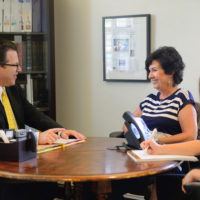Top 11 Rules for Getting Aging Ready

As professional planners and counselors to our clients, we know a great deal about planning ahead and anticipating future needs. As an almost steadfast rule, however, we do not truly practice what we preach. In most cases, we put off our own family’s planning in favor of the work we do for our clients. This article contains the Top 10 Rules for getting aging-ready.As professional planners and counselors to our clients, we know a great deal about planning ahead and anticipating future needs. As an almost steadfast rule, however, we do not truly practice what we preach. In most cases, we put off our own family’s planning in favor of the work we do for our clients. This article contains the Top 10 Rules for getting aging-ready.
1. Talk to your family about your long-term care future. These are not easy or fun discussions to have but without such talks, you will not be sure how to help with your future and you will lack the best tools. You can use this article as an excuse to get the conversation started. Good discussions result in an action list so that important planning opportunities are not lost. Ask yourself where you wish to live if you cannot care for yourself. Have you considered how to pay for the care that may be required? Have you considered what health care you wish to be provided if you are in a terminal, vegetative or end-stage condition. Who would you like to help if you can no longer make decisions on your own. Do you have any insurance (i.e., long-term care insurance, catastrophic health care coverage or similar policies). Where do you keep your important papers and who would you feel comfortable with having copies of your key documents now.
2. A special long-term care Durable Power of Attorney is the single most important document you can sign. A power of attorney document can allow you to pick a person or persons who can step in and do for you if you cannot do for yourself. Even regular powers of attorney can be immensely helpful but there is special language that can be added to powers of attorney for aging and long-term care issues. Some provisions to consider: specific authorization for the agent(s) to create trusts to protect income (general trust creation provisions are not sufficient); authorization (where desirable) for the agents to gift to themselves; authorization to sign admissions agreements for life care facilities; authorization to apply for health and long-term care insurance benefits and to make claims; authorization to apply for government benefits. Some general powers of attorney will work but some third-parties, including the government, will require specificity. Remember that the power of attorney does not give away any of your rights. It simply appoints a helper, albeit one with great authority.
3. Do a new Deed for the home. In most cases, my office recommends a new Deed for the home both to avoid a probate proceeding and to plan ahead should we need to apply for Medicaid. In many cases, we advise the creation of a new deed whereby the home is owned by you for the rest of your life and then, immediately upon death, the property automatically passes to the heirs. Unlike a traditional life estate deed, however, there is no loss of Medicaid eligibility and also unlike a traditional life estate deed, you retain total control. You should NEVER transfer title to anyone else as joint owners or otherwise, without speaking to an Elder Law Attorney as this can cause a loss of Medicaid eligibility and a loss of the homestead creditor and property tax protection.
4. Consider Long-Term Care Insurance. While it is true that my office can most likely show you how to legally shelter your assets and qualify for Medicaid if and when you need it, long-term care insurance can still be important. Contact a reliable independent agent who will show you quotes, terms and ratings from more than one insurer. You may also contact captive agents who sell primarily for only one company but you should then check with others also. Have an Elder Law Attorney review the policy to make sure you buy what you need and nothing more. Talk to the agent about a policy for you as well.
5. Even with significant assets, you may need to qualify for Medicaid. Medicaid is the government program that pays for the cost of long-term care. Medicaid can pay for home care, assisted living, and nursing home care from even the Rolls Royces of providers. In order to qualify, you must be below the government’s financial caps. But, the government is not allowed to count everything and lawyers have also figured out legal ways of converting countable assets to non-countable assets, often without any penalty period. It is possible, through careful and time-tested planning, to legally convert countable assets to Anon-countable assets. Why is this important? Because without planning, you will only qualify for Medicaid after spending all or most of your assets and will then have nothing left to pay for all that Medicaid does not cover. What was once a program for the very poor is now necessarily a program for the middle class as well. That is because nursing home care exceeds $10,000 per month for just one person in a semi-private room. Start planning now or, at the very least, get the documents in place that will allow for future asset protection planning.
6. Procure detailed written directions about end-of-life decision making. One to two page living wills just do not cut it. It takes that long for a good document just to define the terms. I have found that what works best is an integrated package which contains a heath care surrogate designation, living will and health care power of attorney and then explains how these documents interrelate. Great specificity is desired while also leaving enough flexibility to accomplish unanticipated goals. It is not enough to say I do not want artificial procedures, without then carefully defining what is meant by that term. Also, it is important that the document deal with such issues as relieving the surrogate/agent from liability for health care expenses, relieving the doctor of liability so long as the doctors honors the document and considering different procedures or scenarios. The package we use at Solkoff Legal, P.A. is about eight to ten pages long, not because longer is better but because it takes that long to explain one=s wishes. A good Elder Law Attorney will spend considerable time explaining the choices and the documents. Whether you have one of our thorough documents or a one-page form you got for free, it is important that you supply this document to your primary care physician now. You must also have a copy or know where to get to it quickly.
7. Avoid Probate. In most cases, we want our clients to avoid a probate proceeding. Probate is the legal process by which a person=s estate is managed and then distributed. Under Florida law, there are circumstances when a person=s estate must be probated. Probate is almost always necessary when a person dies owning any assets in that person=s name alone. Probate can therefore often be avoided by placing other persons= names on your assets as beneficiaries or co-owners or through the use of trust agreements or other entities. But beware … trusts, beneficiary designations and especially joint ownership, have significant pros and cons. Consider, for example, what would happen if a joint owner gets sued or dies. Consider what would happen if the assets that exist now do not exist in the future and how that will affect the division of assets.
8. Avoid Gifts. Gifts can disqualify people from getting Medicaid when they need it. While we can usually fix gifts, there are sometimes irrevocable consequences. If you wish to gift assets, consult with my office to find out how you may transfer assets without incurring Medicaid gift penalties. Generally speaking, the government looks back five years. It is better to therefore make exempt transfers which are not subject to the look-back rules, rather than risk ineligibility later when you need it. Sometimes, making gifts is advisable. For many reasons, we usually set up irrevocable trusts to receive gifts.
9. Consider Exempt Transfers. Depending upon your age and circumstance, it may be advisable for you to begin making changes to your assets now so that you may qualify for Medicaid if and when you need it. Transfers to children or to trusts can be very advantageous but there are also other methods to protect a family=s life savings. With you attorney, you can consider exempt transfers such as putting money into the home (an already exempt asset), paying off a mortgage, making monthly transfers below the penalty levels and transferring assets to children in exchange for fair value (so not a gift and not penalized).
10. Be Realistic about the Future. I have never met a client who was anxious to move into a nursing home. Most people tell me they do not want to enter a nursing home and yet there are waiting lists to get in. The goal should be to remain as independent as possible with as high a quality of life as possible. Usually this means staying at home until it just does not work anymore. Have a plan for moving into a facility. Without a plan, bad things happen.
11. Get a good lawyer on your side. Nobody likes spending money or seeing large attorneys’ bills. The question is whether the benefits outweigh the fees. During your initial consultation, your attorney should be able to clearly demonstrate the value of the work. In most instances, with the right long-term care asset protection planning, the fees are a pittance compared to the savings. We find that fees are rarely an issue for our clients once everything is understood. Good lawyers cost money and the difference between lawyers can be significant. Elder Law is not a formulaic practice where every attorney makes the same recommendation. It is not a commodity like buying a car. It is more like finding the right surgeon and the difference between the right one and the wrong one can be just as impacting. Only a Florida Bar Board Certified Elder Law Attorney meets the Florida Bar requirements to hold themselves out as a specialist. Do your research. Google. Look at Martindale Hubbell, Avvo and other ratings and look at leadership in the field. There are some very good Elder Law Attorneys. Your job is to find one of those and one you can trust. Read more about Solkoff Legal, P.A. and our qualifications.











